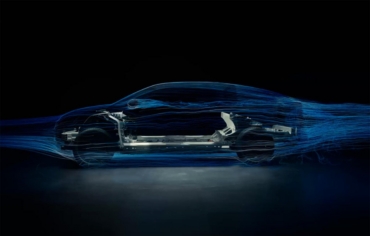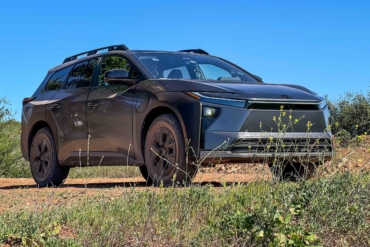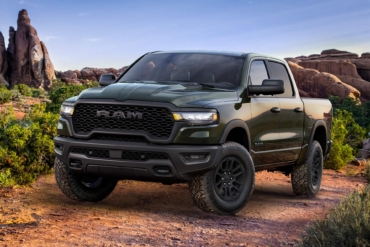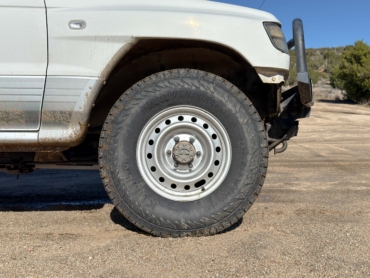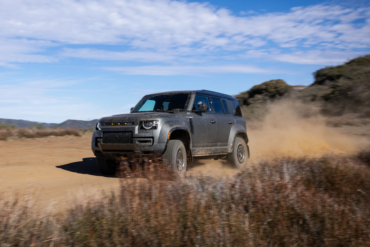The 2023 Jeep Wagoneer L and Grand Wagoneer L are all about more space. But it doesn’t hurt that the premium SUVs are showing off brand-new engines, as well.
To create the Wagoneer L and Grand Wagoneer L, Jeep really only had to make one change. Instead, it made two: everything under the hood and everything from about the B-pillar back.
A new engine family takes its place under the hood, while everything behind the driver gets stretched out. This adds 7 inches to the wheelbase and a foot to the overall length to maximize cargo and passenger space.
Jeep brought us to Bozeman, Montana, to drive the two Ls. That’s big sky country for two big SUVs. Starting at around 5,000 feet and climbing into the mountains around the city was perfect to test the performance of the new engines. Crazy Mountain Ranch — formerly a retreat for Marlboro cigarette contest winners — provided the views, dirt roads, and cattle tracks.
2023 Jeep Wagoneer L and Grand Wagoneer L Review

Hurricane Force Power
We’ll start with the new engines, because, frankly, they’re the bigger surprise. A long-wheelbase model is nothing new — GM and Ford have been doing it for decades with their big SUVs. But a new engine family in 2022 — that’s a big deal.

The 3.0L inline-six is called Hurricane, probably because of the pair of turbochargers that huff horsepower down the intake manifold. Wagoneer L gets a version of the engine that makes 420 horsepower and 468 pound-feet of torque.
The Grand Wagoneer L gets some of its grandness from more boost pressure, forged pistons, and a second fuel pump to make 510 horsepower and 500 pound-feet of torque.
In the L models, only the new 3.0L I6 engines will be offered. The standard-length trucks will get the remaining V8s in inventory from last year. In Wagoneer, the 3.0L six replaces a 392-horsepower 5.7L V8, while in the Grand it’s a 471-horse 6.4L.
Jeep says the inline sixes will deliver “one to two” miles per gallon better on the combined cycle. The number might seem like splitting hairs, but when your V8 is only capable of 15 miles from a gallon of gas, the fuel savings add up.
With a price tag crossing over six figures, we don’t think it’s the fuel economy buyers will care about with the new engines anyway. It’s the feel of the new powerplants, an area where they deliver.
New Engines Are a Better Fit for Wagoneer Character
The standard Wagoneer L’s 420 horsepower is plenty to move this beast of burden along briskly. The engine is torquey and responsive, but more importantly, it’s smooth. Stellantis has done a great job with its Hemi V8, but the I6 and its natural balance is a much better fit in this luxury SUV.
On the highway, the engine is barely audible, with wind noise also at a minimum thanks to laminated glass. Mash the gas and the eight-speed auto drops gears until the I6 sings. Happy to spin to redline with sounds that remind us why BMW and Mercedes-Benz are such fans of this same layout.
The High Output Hurricane is more of the same. The extra 90 horsepower and 42 pound-feet make the Grand Wagoneer L move quicker than the Wagoneer L. A lot quicker, thanks to nearly 100 horses more than any of its competitors. (We’re not counting the 682-horse Cadillac Escalade-V as one of those competitors.)
Toggle Sport mode on the center console and the computer both quickens the shifts and keeps the revs up, making it more engaging than anything this size has a right to be.

Chassis Tuned for Comfort, Not Carving
Handling won’t live up to that power promise, though that’s not really a surprise. The coil springs on the base Wagoneer L and the semi-active air standard on Grand Wagoneer L are biased more toward comfort and ride quality.
Tuned to the new chassis characteristics — more weight and more length — the pair of Ls are solid and serene cruisers that do almost nothing to give away their truck-based underpinnings. But they will never be confused with even a three-row crossover when the road gets twisty.
Making Space

To create the L, Jeep says it had to design a new rear floor, rear ladder structure, rear tub, and new load floors. The frame needed a new center rail and rear extension, and the third-row seat brackets and reinforcements are also new. There is a lot of new metal, about $3,000 worth based on the sticker price hikes.
Seven inches of the L’s extra length goes between the B-pillar and the rear axle, as with the Chevrolet Suburban, which has pushed the rear axle well behind the rear door frame. Both Wagoneer and Grand Wagoneer L get a longer rear door as a result, with the new door taking advantage of the extra length to give rear-seat passengers more space to get in and out.

In the interest of being thorough, I climbed into the third row despite a bad left ankle. Even injured, getting back there was easier than climbing into the rearmost seats of the standard-length vehicle. And I didn’t rip my jeans getting out, which I can’t say about the standard-length Grand Wagoneer.
Surprisingly, there isn’t any extra passenger space for either back row. Legroom is identical, headroom in row three has a tiny change, and that’s all. The changes here are about making getting in and out more accessible, which they’ve accomplished.
Cargo Space Best-in-Class

Cargo space is the other primary function of the L. Behind the third row of seats, Wagoneer L and Grand Wagoneer L transform from ready for an upright carry-on to large enough to lay down and have a nap.
The 42.1 cubic feet of space behind the third row versus 27.4, 85.3 cubic feet with the third row folded versus 70.8, and a whopping 130.9 to 116.7 cubic feet with all of the seats folded. Grand Wagoneer L gets about two cubes more on all of those figures.

It’s best-in-class for cargo space behind the third row and the same for overall passenger volume. To help you use that space, all L models get six cargo tie-down loops, and Grand Wagoneer L models get a cargo management rail system as standard. The roof rack is longer on the L models, but at just 150 pounds, the max capacity doesn’t change.
The extra wheelbase makes only a slight difference to towing. Two-wheel drive Wagoneer L models can tow up to 10,000 pounds, just like the short-wheelbase model. A 4×4 L can tow up to 9,850, with the Grand Wagoneer L at 9,450 pounds.
The latter two are 150 and 350 pounds less than a standard wheelbase model. Even the lowest figure is best in class, so this is still the choice for SUV buyers who want to pull.
Wagoneer L’s Extra Space Comes With Less Capability

Payload does suffer from the L’s stretch. A fully loaded Grand Wagoneer L Series 3 has a payload as low as 1,330 pounds. Split that over seven or even six passengers, and you might not have any capacity left for cargo or your trailer’s tongue weight.
It’s 60 pounds less payload than an SWB model in the top trim, with most trims that give up 100 pounds of payload. That’s a lot of gear you might need to leave behind.
Off-Road Ability Intact

The event’s official off-road trail was limited to SWB models only. That didn’t stop us from taking the Grand Wagoneer L on some dirt roads and ranch trails as well as an actual cow path.
With the air suspension lifted for Off-Road I mode (about 9.0 inches of clearance), the GWL had no problem rolling between cows on the rocky and rutted trail to one of our available photo ops.
Approach, departure, and breakover angles are all slightly lower because of the stretch, but it’s splitting hairs. If you’re willing to drive down it, the L should be able to do it.
On washboard gravel, the stretch didn’t reveal any new creaks, rattles, or flexibility in the chassis. Really, gravel and the Hurricane HO just made me wish for a rear-drive mode so I could hang this beast’s tail out. Instead, I had to take the yacht out for some four-wheel slides.
L Adds Around $3,000 to Sticker Price

The Wagoneer L and Grand Wagoneer L, like the standard wheelbase models, are exactly what they need to be to compete in this class. Massive, solid, powerful, and roomy, with the ability to tow a boat or a camper behind them.
The L models give you more of that cargo room, make it easier to get in and out, and debut a stellar new engine. Which makes the Ls a top pick.
The 2023 4×4 Wagoneer L models start from $65,495 for the base trim, while Grand Wagoneer L’s base price is $91,495. A top-spec Series III Obsidian Grand Wagoneer L rings in at $111,990. The two should go on sale soon.



